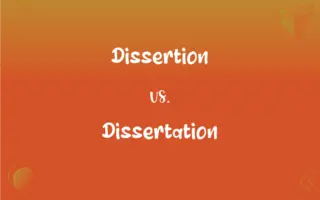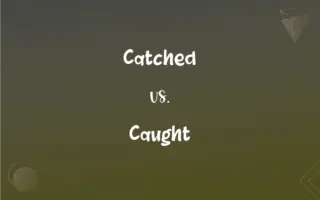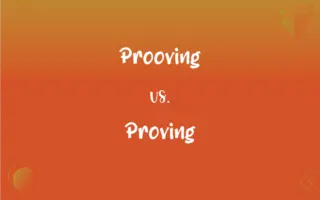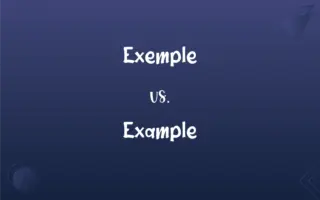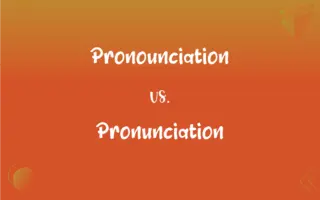Comeing vs. Coming: Mastering the Correct Spelling
Edited by Aimie Carlson || By Janet White || Updated on March 8, 2024
"Comeing" is an incorrect spelling, while "coming" is the correct form, referring to the act of arriving or approaching.
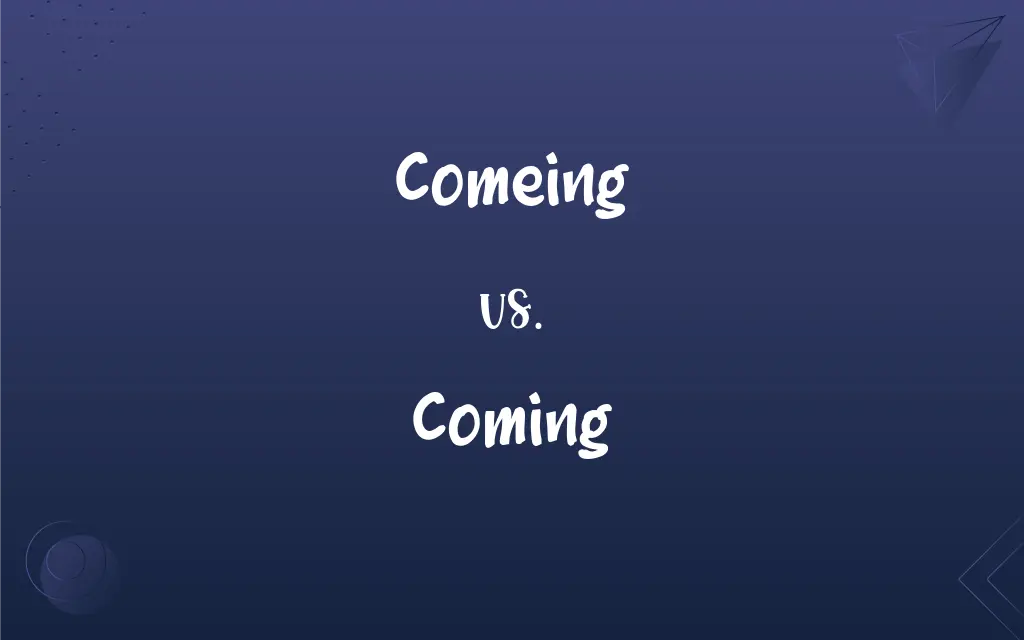
Which is correct: Comeing or Coming
How to spell Coming?

Comeing is Incorrect

Coming is Correct
ADVERTISEMENT
Key Differences
Remember that "coming" follows the common "-ing" verb ending pattern.
Use mnemonics: "O" in "coming" stands for "Only the right spelling."
Practice writing "coming" in sentences to reinforce the correct spelling.
Associate "coming" with "come," its root word, plus "-ing."
Think of "coming" as "com(e)" (root word) + "ing" (present participle suffix).
ADVERTISEMENT
Correct usage of Coming
The train is comeing into the station now.
The train is coming into the station now.
He is comeing to the party tonight.
He is coming to the party tonight.
I didn't hear you comeing in last night.
I didn't hear you coming in last night.
She's been comeing over more often lately.
She's been coming over more often lately.
Are you comeing to the meeting tomorrow?
Are you coming to the meeting tomorrow?
Coming Definitions
Coming also describes something that is imminent or forthcoming.
The coming election is generating a lot of interest.
Coming refers to something that is about to happen or will happen soon.
The coming weekend promises good weather.
Coming can mean emerging or becoming noticeable.
A new trend is coming in fashion.
Coming is the act of reaching a place.
She smiled upon seeing her friend coming.
Coming pertains to future events or periods.
The coming year holds many uncertainties.
Approaching; forthcoming; next
The coming season.
A coming report on arms limitation.
Showing promise of fame or success.
Arrival; advent
The coming of spring.
Present participle of come
The act of arriving; an arrival.
Approaching; of the future, especially the near future; the next.
See you the/this Sunday coming! -Well, maybe I can't the/this coming Sunday but on Sunday week.
She will have two or three paintings in the coming exhibition.
Newly in fashion; advancing into maturity or achievement.
Ergonomic wallets are the coming thing.
(obsolete) Ready to come; complaisant; fond.
Approaching; of the future, especially the near future; the next; as, the coming week or year; the coming exhibition.
Welcome the coming, speed the parting, guest.
Your coming days and years.
Ready to come; complaisant; fond.
Approach; advent; manifestation; as, the coming of the train.
Specifically: The Second Advent of Christ, called usually the second coming.
The act of drawing spatially closer to something;
The hunter's approach scattered the geese
Arrival that has been awaited (especially of something momentous);
The advent of the computer
The temporal property of becoming nearer in time;
The approach of winter
The moment of most intense pleasure in sexual intercourse
Of the relatively near future;
The approaching election
This coming Thursday
The forthcoming holidays
The upcoming spring fashions
Yet to come;
Coming generations
A future-day Gibbon of Macaulay
Coming Sentences
Winter is coming, and it's going to be cold.
The holidays are coming up soon.
The new model of the phone is coming out next month.
Are the guests coming by car or train?
The storm is coming; we should head indoors.
She's coming with us to the cinema.
He's coming back from his trip tomorrow.
Spring is coming, and the flowers are starting to bloom.
I'm coming home for dinner.
The deadline is coming up; we need to hurry.
They're coming to an agreement after the long discussion.
My birthday is coming up in a few days.
Her book is coming out in the spring.
The meeting is coming to an end.
The change in weather is coming on fast.
The teacher announced that a test is coming next week.
I heard footsteps coming down the hall.
The changes in the law are coming into effect soon.
I can see the bus coming down the road.
The sun is coming up; it's almost morning.
Coming Idioms & Phrases
Coming to terms with
To gradually accept a difficult or unpleasant situation.
He's coming to terms with the fact that he needs to change his lifestyle for his health.
Coming full circle
Returning to the original position or state of affairs after a series of events.
Her career has come full circle, and she's now teaching at her old high school.
Coming out on top
To end up in a victorious or successful position.
Despite the challenges, our team came out on top.
Coming into one's own
To reach a state of competence or acceptance, especially after a period of growth or development.
After years of practice, the musician is finally coming into his own.
A long time coming
Something that has been needed or expected for a long time.
The community center was a long time coming, but it's finally being built.
Coming of age
The transition from childhood to adulthood.
The novel is about the protagonist's coming of age.
Coming down the pike
Something anticipated to happen in the near future.
There are several new projects coming down the pike.
Coming to light
Becoming known or apparent.
New evidence about the case is coming to light.
Coming into play
Becoming important or effective in a particular situation.
Several factors are coming into play in the decision-making process.
Coming to a head
Reaching a critical or pivotal point.
The dispute between the two departments is coming to a head.
FAQs
Which vowel is used before coming?
The vowel "o" is used in "coming."
Why is it called coming?
It's called "coming" because it denotes the act of arriving or approaching.
What is the pronunciation of coming?
"Coming" is pronounced as /ˈkʌmɪŋ/.
What is the root word of coming?
The root word of "coming" is "come."
What is the plural form of coming?
"Coming" remains the same in its plural form.
Which preposition is used with coming?
Prepositions like "in," "at," and "on" are often used with "coming."
What is the verb form of coming?
"Coming" is the present participle form of the verb "come."
Is coming a noun or adjective?
"Coming" can be both a noun (gerund) and an adjective.
What is the singular form of coming?
"Coming" is both singular and plural in form.
Which conjunction is used with coming?
Conjunctions like "and" or "but" can be used with "coming."
What part of speech is coming?
"Coming" can be a verb (present participle), noun, or adjective.
Is coming a negative or positive word?
"Coming" is neutral; context determines its positive or negative connotation.
Is coming a countable noun?
No, "coming" is not a countable noun.
Is the coming term a metaphor?
"Coming" can be used metaphorically, depending on context.
How is coming used in a sentence?
"He is coming to the party tonight."
What is a stressed syllable in coming?
The first syllable, "com," is stressed in "coming."
What is another term for coming?
Another term for "coming" is "approaching."
What is the second form of coming?
The second form is "came."
Which article is used with coming?
Articles like "the" or "a" are used with "coming."
Is coming a vowel or consonant?
"Coming" is a word, not a vowel or consonant.
How many syllables are in coming?
"Coming" has two syllables.
How do we divide coming into syllables?
"Coming" is divided as com-ing.
What is the first form of coming?
The first form is "come."
What is the third form of coming?
The third form is "come."
Is coming an adverb?
No, "coming" is not typically an adverb.
Is coming a collective noun?
No, "coming" is not a collective noun.
Is the word coming is imperative?
No, "coming" is not an imperative form.
What is the opposite of coming?
The opposite of "coming" is "going" or "leaving."
Is coming an abstract noun?
As a gerund, "coming" can be considered an abstract noun.
Which determiner is used with coming?
Determiners like "the," "this," or "next" are used with "coming."
About Author
Written by
Janet WhiteJanet White has been an esteemed writer and blogger for Difference Wiki. Holding a Master's degree in Science and Medical Journalism from the prestigious Boston University, she has consistently demonstrated her expertise and passion for her field. When she's not immersed in her work, Janet relishes her time exercising, delving into a good book, and cherishing moments with friends and family.
Edited by
Aimie CarlsonAimie Carlson, holding a master's degree in English literature, is a fervent English language enthusiast. She lends her writing talents to Difference Wiki, a prominent website that specializes in comparisons, offering readers insightful analyses that both captivate and inform.
